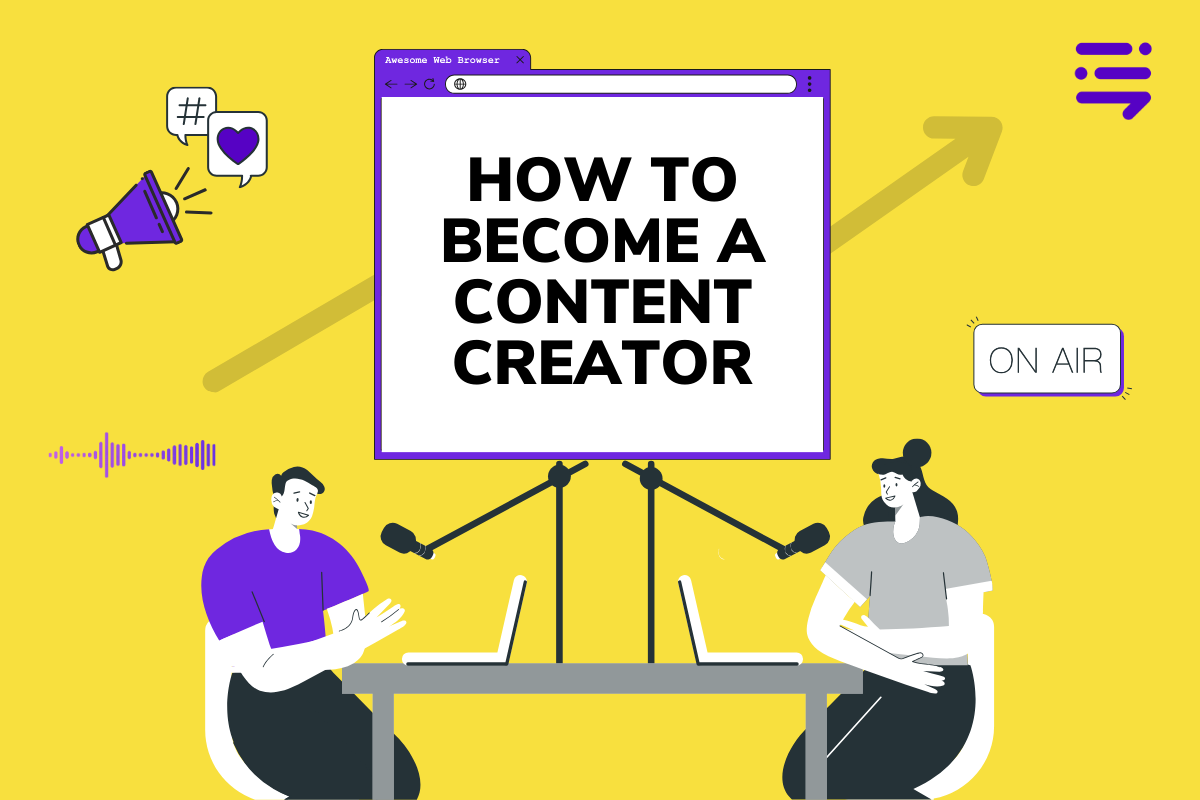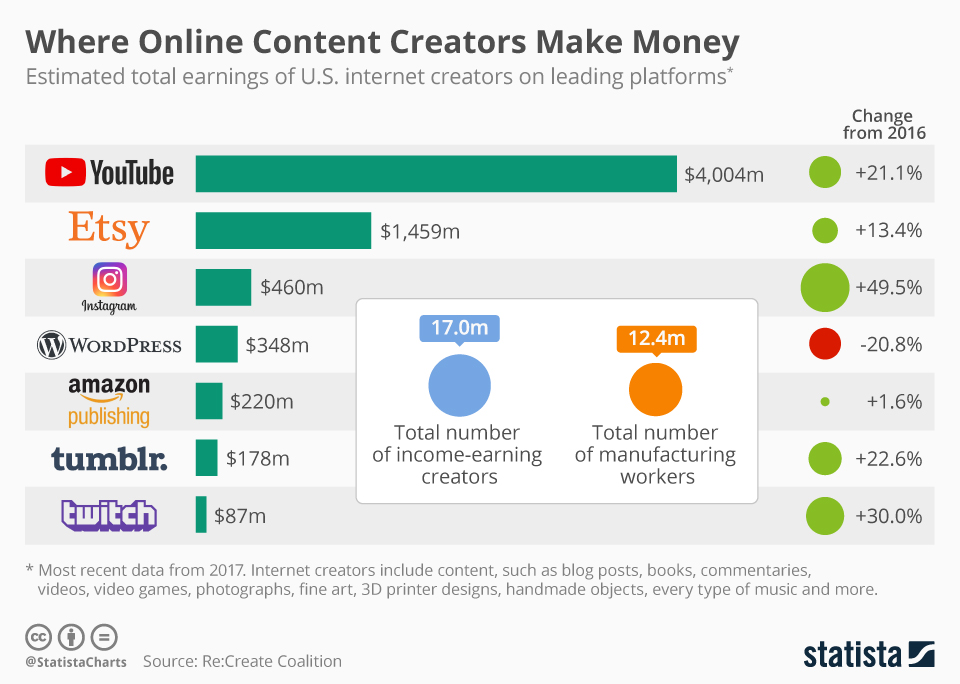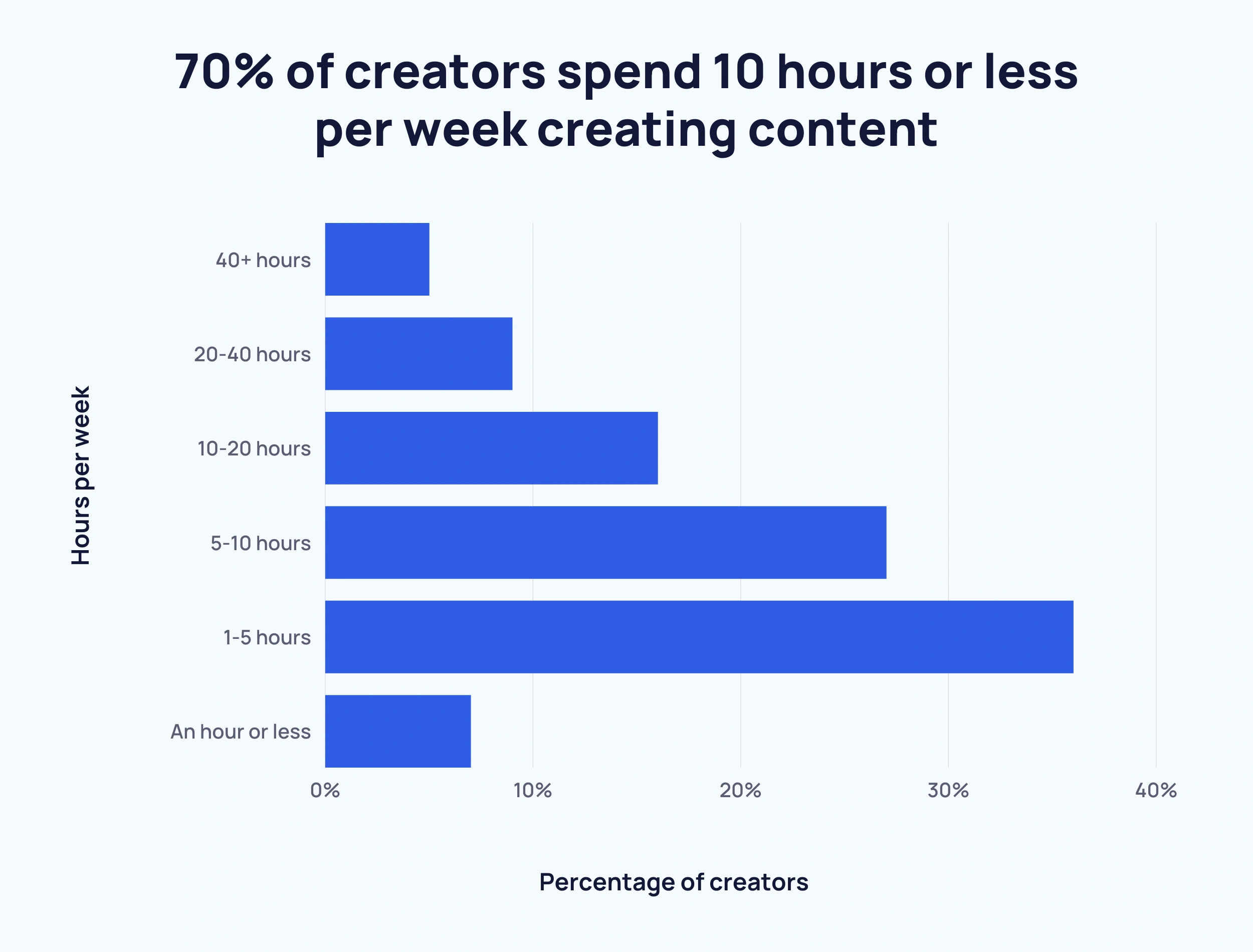Discover top guides, trends, tips and expertise from AIO Writers
How to Become a Content Creator: A Step-by-Step Guide
Julia McCoy
Friday, 19th Jan 2024
The digital content creation market is expected to record a CAGR of 25.7% from 2023 to 2032, with its value likely to reach $181.4 billion by the end of the forecast period. Content creators in the United States are earning close to $62,000 per year, with the most successful content creators easily making six figures.
You want a piece of this delicious pie but you don’t know how to become a content creator.
Let me help you turn this dream into reality.
In this blog post, I will show you how to become a content creator and be good at it.
Strategies to map out, skills to hone, and tools to master — this guide has got you covered.
Ready to start a new career path and become a successful content creator? Let’s dive in.
Table Of Contents:
- What is a Content Creator?
- Types of Content Creators
- How to Become a Content Creator: A Step-by-Step Guide
- FAQs – How to Become a Content Creator
- Conclusion
What is a Content Creator?
A content creator is an individual who consistently creates and shares various forms of digital content such as videos, photos, blog posts, ebooks, or social media posts. These creators don’t necessarily need any special qualifications to begin their journey in the world of content creation. However, regular posting and engaging with their audience are crucial elements for success.
The role of a content creator has gained significant recognition over the past decade with platforms like TikTok providing opportunities for individuals to build successful careers by creating unique and entertaining content.
A prime example is Khaby Lame who now has 161 million followers on TikTok, thanks to his short videos where he silently — and hilariously — mocks overly complicated life hacks.
If you’ve ever found yourself watching your favorite content creator’s latest video and wondering if you could do it too, the answer is yes!
Becoming a successful content creator doesn’t require any special skills or training; all it takes is consistency in producing interesting and engaging material that resonates with your audience.


Source: Statista
Types of Content Creators
The first step in becoming a successful content creator is knowing what type of content you want to create and share.
Let’s look at the five most popular types of content creators today.
1. Social Media Influencer
A social media influencer is someone who has established credibility within their niche and can influence their followers’ decisions. They often have partnerships or sponsorships with companies that want to reach out to their community.
We saw how powerful a social media influencer can be when back in 2020, football star Cristiano Ronaldo removed two Coca-Cola bottles from his press conference table and encouraged people to drink water instead. This resulted in a $4 billion plunge in Coca-Cola’s market value ($242B to $238B), with share prices dropping from $56.10 to $55.22 after Ronaldo’s gesture.
Most influencers start on one platform before expanding across multiple channels once they’ve built up a solid following. If you’re charismatic and passionate about sharing insights or experiences on social media platforms like Instagram or YouTube, this could be your path!
2. Blogger
If writing is more your style and you enjoy researching topics thoroughly, blogging might be for you.
Bloggers write articles either on personal websites or third-party publishing platforms such as Medium.
You can monetize blogging through paid ad placements where people pay to advertise products/services on your website. The key here lies in producing engaging content consistently while optimizing it for search engines (SEO) to increase your visibility and reach.


Source: Linktree
3. Vlogger
Love videos? Why not become a content creator and start a vlog?
Becoming a successful vlogger is no longer just about passion; it’s also an excellent way to earn money. With the right approach, you can turn your love for creating videos into a profitable venture.
First, identify your niche or area of interest. This could be anything from cooking, fashion, travel, tech reviews, or lifestyle tips. This must be something you’re really passionate about as it will reflect in your content.
Your success as a content creator largely depends on the quality of the videos you create. Invest time in learning video editing skills and make sure your videos are engaging and informative.
4. Podcaster
Radios are out, podcasts are in.
As the popularity of podcasts continues to rise, many people are wondering how they can turn their passion into a profitable venture.
The first step in becoming a successful podcaster is identifying your niche or topic of interest. This could be anything from business advice to movie reviews — as long as it’s something you’re passionate about and knowledgeable in.
Research what kind of content is already out there within your chosen field so that you can find unique angles or perspectives not yet covered by others.
A good podcast strategy involves planning your episodes ahead of time. Decide on topics, guests (if any), recording schedules, and release dates well in advance so that everything runs smoothly once production begins.
Your listeners deserve high-quality audio which means investing in decent microphones and headphones at the minimum. There are plenty of affordable options available online suitable for beginners all the way up to professional podcast hosts.
No matter how great your raw recordings may sound, editing is crucial for delivering polished final products that keep audiences coming back episode after episode. Learn basic editing techniques using software like Audacity or GarageBand — both are free tools perfect for beginner editors.
5. Educator
If you’re passionate about sharing knowledge and have an area of expertise, becoming a creator educator could be the perfect career path for you. Not only does it allow you to do what you love, but with the right strategy in place, it can also become a lucrative income source.
The first step towards becoming a successful educator creator is identifying your niche. This involves understanding what unique insights or skills you bring to the table that others might find valuable. Whether it’s cooking, digital marketing, or fitness training, your niche should be something that excites and motivates you.
A key aspect of how to become a content creator lies in knowing who your audience is. Understanding their needs, interests, and challenges will help guide your content creation process.
Remember quality trumps quantity. Focus on producing high-quality pieces that provide value rather than churning out sub-par work frequently.
Becoming a successful content creator educator is not an overnight process. It requires consistency, creativity, and dedication. But with these steps in place, you’re well on your way toward turning your passion into profit!


How to Become a Content Creator: A Step-by-Step Guide
Now that you know what type of content creator you want to be, let’s break down the steps of how to create content that will resonate with your audience — and make you money.
1. Identify Your Niche and Audience
Finding your sweet spot in content creation starts with zeroing in on the right niche.
Think about what you love, know a lot about, or want to explore more.
This passion becomes your north star as you carve out a space online that feels like home.
To really get it right, do some digging into market demand using tools like Google Trends or BuzzSumo.
You’ll see what topics are hot and which ones have staying power — because no one wants to be yesterday’s news.
But remember, just because something is popular doesn’t mean it’s for you; authenticity wins the race every time.
Know Who You’re Talking To
Your audience isn’t everyone — let’s get that straight from the start.
The better you understand who they are and what makes them tick, the closer your content hits home.
Sure, demographics give us age brackets and locations but go deeper than numbers.
Dive into forums like Reddit or Quora where people aren’t shy about their opinions — you’ll find gold there.
And don’t forget social media analytics. They’re not just pretty charts; they tell stories of real folks engaging with similar content.
Beyond stats lie psychographics — values, beliefs, interests — it’s where connections happen.
Surveys can help too. Try crafting simple questions on platforms such as Typeform or SurveyMonkey to peel back layers of insight directly from potential followers.
When these pieces come together — the niche passion paired with a target audience — you’ve got yourself a roadmap to how to become a successful content creator.
2. Crafting a Unique Value Proposition
Standing out in the content creation game is like being a unique voice in a choir.
Your unique value proposition (UVP) is your solo moment that captures the audience’s attention.
It’s what makes people choose you over countless others.
To find your UVP, pinpoint what you offer that no one else can. This could be your personal story, expertise, or an innovative approach to common problems.
Then weave this golden thread through every piece of content you create. Make it as clear and compelling as possible; let them see why they should care about what you have to say.
If writing isn’t your strong suit but strategy is, then make strategic insights your UVP.
Perhaps humor sets you apart, or maybe you can explain complex ideas simply. Lean into these strengths with confidence and clarity.
A solid UVP gives potential followers a reason to stick around and engage with your work because it promises something they can’t get elsewhere — something only YOU provide.
3. Find The Right Tools
Picking the right tools can make or break your content creation game.
Think of it like being a chef; you need sharp knives, a sturdy cutting board, and the perfect pan to whip up that five-star dish.
In the digital kitchen, high-quality microphones are your knives slicing through noise for clear audio.
A reliable camera acts as your cutting board, providing a stable base to present visual feasts in stunning detail.
Lights? They’re like that trusty pan evenly cooking up scenes so viewers get every flavor-packed pixel. Don’t skimp on good lighting!
Your laptop is essentially the oven where all these ingredients come together. A powerful processor ensures nothing burns while multitasking through edits and uploads.
And let’s not forget software spices – Adobe Creative Suite adds zest with its editing capabilities while Canva offers quick garnishing options for graphics.
If you’re a blogger, let AI help you overcome writer’s block! With tools like BrandWell, you can have a well-written, research-backed baseline draft in under 5 minutes.
Whether you’re working with a shoestring budget or have some cash to splash, there’s gear out there that won’t cost an arm and leg but still does wonders.
4. Master Content Production Skills
You’ve got a knack for storytelling, but it’s time to sharpen your tools. Writing is just the start.
Hone those skills by practicing daily and studying from giants like Copyblogger and Content Hacker. Their tips can transform your drafts into compelling stories.
Edit until it hurts; then edit some more. Tools like Grammarly will be your best friends here, catching errors before they reach the audience’s eyes.
Dive into video production with online courses that teach you to capture and edit like a pro. Check out platforms like Coursera or Udemy.
Let’s not forget design — it wraps your content in visual appeal. Canva offers an intuitive way to create graphics that resonate with viewers even if you’re not a seasoned designer yet.
All these skills intertwine, creating a tapestry of expertise that draws audiences in and keeps them coming back for more. It’s about mixing precision with creativity — your blueprint for success as a modern-day storyteller.
5. Grow Your Online Presence
So you’ve got killer content and now it’s time to shine online.
You need a plan that takes you from a hidden gem to a household name.
Let’s talk about social media engagement, the lifeblood of your digital footprint.
Dive into platforms where your audience hangs out and chat them up like old friends at a coffee shop.
Become an SEO wizard by weaving keywords into your posts — Google will love you for it.
Mingle with fellow creators because collaboration is the new competition.
Think cross-promotions or guest posting; they’re like getting introduced at a party by someone everyone admires. It puts eyes on you in all the right ways.
The key? Consistency meets quality — you can’t have one without the other if you want folks to come back for more.
Craft each post so readers know exactly what flavor of awesome they’ll get from following you, then deliver that promise every single time.
6. Monetize Your Content
You’ve got the content, but how do you turn that into cash?
Let’s break it down.
Advertising Revenue: The Classic Route
Ads can be a gold mine for content creators. Platforms like Google AdSense make it easy to start earning money by displaying ads on your site or videos. It’s simple; more views mean more revenue.
The key is to keep your audience engaged so they stick around long enough for those ads to count. Think of your content as prime real estate and every ad displayed as rent being paid right into your pocket.
Sponsorships: Partnering Up
Landing a sponsorship deal can feel like hitting the jackpot. But don’t wait around hoping sponsors will find you. Reach out through platforms such as AspireIQ or GRIN where you can connect with brands looking for content creators to showcase their products.
Show potential sponsors why teaming up with you is worth their investment. Share insights about your audience and highlight what makes your approach unique because, at the end of the day, it’s all about mutual growth and success.
Make Merchandise Work For You
Gone are the days when merchandise was an afterthought — it’s now front and center in a content creator’s arsenal. Services like Printful let creators design custom merch without worrying about inventory or shipping headaches.
Merch lets fans wear their support on their sleeves — literally — and each sale adds another stream of income for you.
FAQs – How to Become a Content Creator
What do you need to be a content creator?
To kick off, you’ll want a solid grasp of your chosen platform, creative flair, and the right gear to create and edit content.
Do content creators get paid?
Absolutely. Through ads, sponsorships, merch sales, or fan subscriptions — content creation can pull in real cash.
Can I be a content creator with no experience?
Sure thing. Start from scratch by learning as you go and consistently putting out fresh material; everyone begins somewhere.
How much does a content creator make?
Earnings vary wildly — from pocket change to six figures — depending on your niche expertise, social media audience size, and monetization tactics.
Conclusion
Learning how to become a content creator is your first step. Carving out your niche and connecting with an audience has opened doors.
Dig into the digital terrain, lay down a solid strategy, and show up consistently — these are your beacons so keep them lit.
Harness tools that elevate; skills like writing or video editing can set you apart. Practice makes perfect here.
Grow roots online through engagement, SEO smarts, and partnerships — they’re key in this game. Your presence will bloom from these seeds.
Finally, cash in on creativity: ads, sponsorships, sales — the works!
Turning passion into profit isn’t just possible; it’s within reach when you put in the work.
If you want to create content but don’t know where to start, try BrandWell. You’ll get plenty of topic suggestions and feed them right into the long-form content writer. Within minutes, you’ll have a fresh blog post, social media post, or scripts for your next video or podcast.

UNLOCK YOUR POTENTIAL
Long Headline that highlights Value Proposition of Lead Magnet
Grab a front row seat to our video masterclasses, interviews, case studies, tutorials, and guides.



